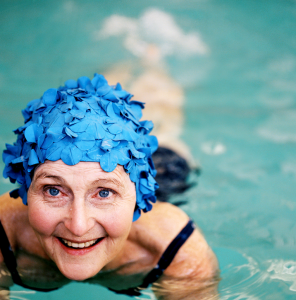By Dr. James M. Davenport, F-AAA, CCC-A –
 There’s really no way around it. Unless you opt for a completely water-proof hearing aid, you’ll have to remember to remove yours before jumping in the pool this summer. Moisture is one of major reasons hearing aids are returned for repair.
There’s really no way around it. Unless you opt for a completely water-proof hearing aid, you’ll have to remember to remove yours before jumping in the pool this summer. Moisture is one of major reasons hearing aids are returned for repair.
So how do you keep your hearing aids safe when you’re swimming, boating or playing at the water park? Here are a few tips to keep you involved in the summer fun while protecting your hearing aids at the same time.
1. Be prepared.
If you know you’ll be immersed in water, remove your hearing aids and store them in a safe, dry place.
Consider keeping a variety of small, waterproof containers on hand for the season. Keep one with your sunscreen, sunglasses and other summer fun items so you have it on hand whenever you need it. Look for these containers, in a variety of shapes, colors and sizes, in the water sports department of sporting goods stores. They’re inexpensive so you can buy several to keep in the car, the boat, at the lake, or wherever you may find yourself in a wet situation. In a pinch, try using a zippered plastic baggie. They aren’t always completely water tight, but they may keep your hearing aids dry enough in an emergency situation.
2. Accessorize.
If you’ll be playing around water – but not in it – consider purchasing hearing aid sleeves and cords to wear for the occasion.
Sleeves fit most hearing aid models and are made of water resistant spandex nylon. The sleeve protects the hearing aid amplifier, case, controls and battery compartment from moisture and other environmental elements, while still allowing sound to enter the microphone. Although these sleeves won’t protect your hearing aid if it’s completely immersed in water, they will help minimize the damage from excessive perspiration – as well as the misdirected stream from your grandson’s water gun.
Cords attach to the hearing aid sleeve and clip to your shirt or jacket. This prevents your hearing aid from accidentally falling into the water or onto a hard surface where it can be damaged.
3. Invest in a hearing aid dryer.
Even if you’re as careful as can be, there’s always the possibility that you’ll accidentally drop your hearing aid in the bathroom sink or jump into the pool without remembering to remove them first. If this happens, don’t panic. Take them out of the water immediately and dry them off as quickly as possible. Remove the batteries and dry the battery compartment. Put them into a hearing aid dryer – also known as a dehumidifier – and let them dry overnight. If your hearing aids still don’t work the next morning, take them into your audiologist or hearing aid center for repair.
4. Consider water-resistant hearing aids.
If your job or hobby puts you near the water during the summer, or you live in an extremely humid climate, it may be wise to invest in water-resistant hearing aids. These keep moisture from collecting in the earmold tube. Although they aren’t completely water proof, they will help reduce the damage due to moisture for users living in humid climates or those who perspire excessively.
5. Check into purchasing hearing aid insurance.
Much like cell phone insurance, these policies help protect your investment against loss, damage and repair. If your homeowner’s insurance doesn’t cover your aids, check with your hearing aid manufacturer or hearing aid center to see which companies they recommend.
Lake County Hearing And Balance Clinic
352.343.4488
www.lakecountyhearingclinic.com
Tags featured
Check Also
Recurrent UTIs: Addressing the Risk of Antibiotic Resistance
Urinary tract infections (UTIs) are common bacterial infections that affect millions of individuals worldwide each …
 Central Florida Health and Wellness Magazine Health and Wellness Articles of the Villages
Central Florida Health and Wellness Magazine Health and Wellness Articles of the Villages



